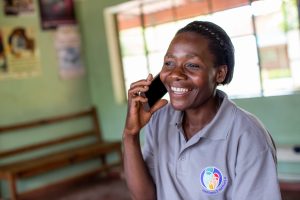Digital Health Services: Pivoting to a Hybrid Approach

A Mentor Mother talking to a client by phone in Mulanje, Malawi
COVID-19 pushed already fragile health systems to the brink and quickly made it clear that traditional face-to-face models of service delivery had to evolve to protect frontline health workers and communities, and stop the transmission of the virus. This promoted a rapid increase in the number and scope of digital health services and tools to support health service delivery during COVID-19 and beyond.
At mothers2mothers (m2m), we realised early on in the pandemic that one of the best ways we could keep the Mentor Mothers we employ as frontline health workers safe and healthy—and make it possible for them to continue providing the more than one million women and families they reach each year with vital health services and support when it was needed most—was to quickly innovate and expand our digital services. That resulted in accelerating the development and launching two new digital health solutions, which we rapidly rolled across the countries where we operate. They include:
Peer support via phone services:
Our frontline health workers now provide a combination of in-person and digital services, reaching clients by phone, text, and WhatsApp when they are unable to meet in person. This phone and WhatsApp outreach is underpinned by an app that guides our team through structured and scripted calls. We also decide on the “dosage” between in-person and remote services depending on a client’s risk profile.
Virtual Mentor Mother Platform (VMMP):
As well as these remote services, we also launched an interactive WhatsApp chatbot tool that provides information and referrals on a wide range of health issues—such as COVID-19, safe motherhood, healthy childhoods, teen health, living with HIV, chronic disease, and family health—that’s translated into 23 languages across nine countries. This has opened a new way for our frontline team to bring trusted information and support to more people. There’s also a help desk to answer more complex queries.
m2m is pleased that although designed and rolled out under pressure, our eServices solution has remained consistent and solid. Since its launch in April last year, a total of 365,144* clients have been reached through eServices. By the end of June 2021, m2m saw the largest increase of new registrations for the VMMP—with a jump from 4,834 in the first quarter to 10,897. Furthermore, eServices have contributed to sustained and even improved, health outcomes among our clients. For example, 94% of clients who accessed services through eServices reported high adherence to antiretroviral treatment, 87% of clients had a viral load test done, and 93% of clients were virally suppressed.
m2m’s frontline staff have embraced their new digital tools: “The eService delivery model has been helpful to our clients. They are now able to receive services virtually, i.e. health messages, referrals, and reminders on the upcoming services or missed services. It has also helped to protect both the client and Mentor Mothers by reducing direct contact and risk of exposure to COVID-19,” said Miriam Kalinga Kitenge, Community Mentor Mother, Kenya.
“eServices have helped us stay in touch with our clients during COVID-19 when we went into a strict lockdown and could not visit clients at their homes. I can continue to provide care to my clients and keep track of their progress, especially mothers who are transitioning from antenatal to postnatal care,” adds Bridget Mulusa, Mentor Mother, Zambia.
While some countries have eased lockdown restrictions making it easier for Mentor Mothers to meet their clients in person, we plan to continue to reach and support our clients through eServices and make them an integral part of m2m’s hybrid service delivery model, by continuing to evolve and improve services informed by the challenges we faced during the rollout.
The opportunities that this hybrid approach to health service delivery can have in sub-Saharan Africa in achieving the Sustainable Development Goals will take centre stage at a virtual event, hosted by m2m on Wednesday, 10th of November. We will convene a group of leading thinkers to share experiences around the role of technology in health service delivery, with a particular focus on how to blend digital services with in-person efforts for the best possible outcomes for clients and health workers alike. We hope this event will help break down some silos in conversations and really put the health worker perspective at the centre, as well as highlight some of the broader systems issues like the cost of mobile devices and data that hold back progress.
This event is being supported by a “Shapers Council” of senior representatives from Bill and Melinda Gates Foundation, BRAC, Johnson & Johnson, m2m, United Nations Population Fund, and United States Agency for International Development. To register, click here or email [email protected] for more information.
*Data sourced from m2m 2021 Quarter Two Report: https://m2m.org/wp-content/uploads/2021/08/21_0824_QR_Final_ExcludesAppendices.pdf






















